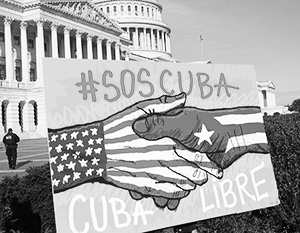Why Has the US Been Inconsistent in Not Supporting Taiwan Independence?
(Taiwan) on 6 June 2022
by Chen I-hsin (link to original)
The State Department has indeed adjusted its website as the international situation changes. Before these two most recent changes, the version of the Taiwan fact sheet was old, from August 2018, and had remained unchanged even after Joe Biden took office.
It was only on May 5, 2022, that the State Department revised this 2018 version. It removed the aforementioned sentences and added that the United States’ One-China policy remained unchanged, considering the Taiwan Relations Act, the three U.S.-China Joint Communiques and the Six Assurances.
In the May 28 revision of the State Department’s fact sheet, the sentence “the United States does not support Taiwan independence” was added back in, while the other sentence — “Taiwan is a part of China” — was not. This resolution by the State Department fully demonstrates that the Biden administration’s strategy toward both sides of the Taiwan Strait has already undergone significant, even essential, changes.
First, Russia’s invasion of Ukraine deepened the Biden administration’s suspicion that China will forcefully take over Taiwan. Kurt Campbell, the White House Indo-Pacific coordinator, and Laura Rosenberger, the senior director for China on the National Security Council, spoke secretly with British officials in March about the U.K.’s role should the U.S. decide to go to war with China. These talks show that the Biden administration is seriously considering the possibility the U.S. will become involved in a cross-strait conflict.
Without a doubt, the Russia-Ukraine war has strengthened Japan’s crisis awareness. Tokyo understands even more strongly that once something happens in the Taiwan Strait, the impact on Japan might be more severe than previously estimated. This primarily explains why Japanese Prime Minister Fumio Kishida stated that no aggression will be allowed in East Asia. The Ministry of Defense even decided to send an active duty defense member to Taipei for a lengthy visit to ascertain the cross-strait situation and trends. Evidently, Japan, like the U.S., is increasingly concerned that China will forcefully take over Taiwan.
Second, the State Department’s removal of “Taiwan is a part of China” is undoubtedly more in line with the essence of the Six Assurances, in which Taiwan’s sovereignty is unaffected (the fourth assurance states, “[t]here has been no change in our longstanding position on the issue of sovereignty over Taiwan.”)
.
Third, the U.S. believes that the chances of China invading Taiwan should not be underestimated. Therefore, State Department legal experts naturally think the sentence must be removed, thereby eliminating legal obstacles should the U.S. decide to intervene in a conflict in the Taiwan Strait.
Fourth, the Biden administration feels that the removal of the phrase from the State Department’s site is in line with both Democratic and Republican foreign policy. After all, during Donald Trump’s presidency, Secretary of State Mike Pompeo also publicly stated, “Taiwan is not a part of China.” Based on this point of view, the removal of “Taiwan is a part of China” is the result of foresight by the Biden administration.
As for adding back in “the United States does not support Taiwan independence” to the State Department’s website, it was to be expected. It can even be said that the U.S. was only pretending to remove it as a way of bargaining with China.
First, the U.S. understood that the May 5 webpage revision would be met with strong protests from Beijing. Moreover, U.S. officials who have to communicate with Chinese officials about this matter understand that China cares more about the removal of “the United States does not support Taiwan independence.” With that sentence still there, Beijing’s One-China policy would vanish. The removal is tantamount to indicating that the U.S. thinks differently about Taiwan, or at least is not as resolute toward Taiwan as before.
Second, successive U.S. presidents have long said that they do not support Taiwan independence. Even though Beijing feels Washington is hollowing out the One-China policy, the two sides will be unlikely to have a falling out as long as, at summits and other public events, the U.S. says it does not support Taiwan independence.
Third, the U.S. believes that the words “does not support Taiwan independence” can be discussed and reinstated. Fourth, of the two sentences removed from the State Department’s site on May 5, one was removed because the U.S. wanted it gone, and the other was removed because the Chinese required it to be gone. The May 28 site revision is probably the result of both sides getting what they wanted.
In brief, the State Department waffled back and forth during one month in order, on the one hand, to remove legal obstacles should it have to intervene in a crisis in the Taiwan Strait; on the other hand, it was to reassure Beijing that the U.S. has not changed its position on the One-China policy or lack of support for Taiwan independence.

